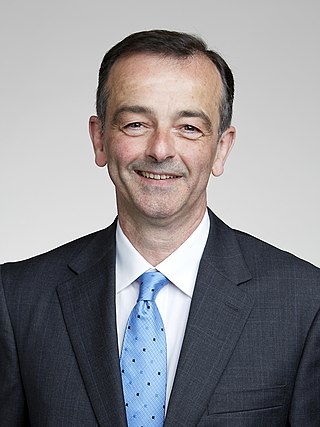Related Research Articles

Sir Paul Patrick Gordon Bateson, was an English biologist with interests in ethology and phenotypic plasticity. Bateson was a professor at the University of Cambridge and served as president of the Zoological Society of London from 2004 to 2014.

The Department of Materials at the University of Oxford, England was founded in the 1950s as the Department of Metallurgy, by William Hume-Rothery, who was a reader in Oxford's Department of Inorganic Chemistry. It is part of the university's Mathematical, Physical and Life Sciences Division
The Royal College of Science Motor Club was set up in 1955 to maintain "Jezebel", a 1916 Dennis N-Type fire engine and a mascot of the students of the Royal College of Science, one of the founding three colleges of Imperial College London, in South Kensington.
Sir Hugh Charles Jonathan Godfray CBE FRS is a British zoologist. He is Professor of Population Biology at Balliol College, Oxford, Director of the Oxford Martin School and Director Oxford Martin Programme on the Future of Food.
Joan Woodward was a British professor in industrial sociology and organizational studies.
Christopher Michael Hull is a professor of theoretical physics at Imperial College London. Hull is known for his work on string theory, M-theory, and generalized complex structures. Edward Witten drew partially from Hull's work for his development of M-theory.
Stephan Konrad Matthai is a German geologist and petroleum engineer. He is currently Professor of Reservoir Engineering at University of Melbourne. Previously he had the same position at the University of Leoben.
Alan Hardwick Windle FRS is a British material scientist, and Chair of Materials Science at Cambridge University.
Roger Ekins FRS was a British biophysicist and professor at University College London. He was awarded the 1998 Edwin F. Ullman Award.
Derek John Fray is a British material scientist, and professor at the University of Cambridge.

Ernest Demetrious Hondros was a British material scientist, and visiting professor at Imperial College London.

Martin Robert Bridson is a Manx mathematician. He is Whitehead Professor of Pure Mathematics at the University of Oxford, and the president of the Clay Mathematics Institute. He was previously the head of Oxford's Mathematical Institute. He is a fellow of Magdalen College, Oxford and an honorary fellow of Hertford College, Oxford. Specializing in geometry, topology and group theory, Bridson is best known for his work in geometric group theory.

Dame Molly Morag Stevens is the John Black Professor of Bionanoscience at the University of Oxford's Department of Physiology, Anatomy & Genetics. She is Deputy Director of the Kavli Institute for Nanoscience Discovery and a member of the Department for Engineering Science and the Institute for Biomedical Engineering.
The Royal Society University Research Fellowship (URF) is a research fellowship awarded to outstanding early career scientists in the United Kingdom who are judged by the Royal Society to have the potential to become leaders in their field. The research fellowship funds all areas of research in natural science including life sciences, physical sciences and engineering, but excluding clinical medicine.

James Robert DurrantFRSC FLSW is a British photochemist. He is a professor of photochemistry at Imperial College London and Sêr Cymru Solar Professor at Swansea University. He serves as director of the centre for plastic electronics (CPE).

Sir Robin William Grimes is a British nuclear scientist who is chief scientific adviser in the Ministry of Defense (MoD) for nuclear science and technology and professor of materials physics at Imperial College London. From February 2013 to August 2018 he served as chief scientific adviser to the Foreign and Commonwealth Office (FCO). Since November 2021 he has been Foreign Secretary of The Royal Society

Guy Roderick Wilkinson is a particle physicist, working on the Large Hadron Collider project at CERN, professor of physics at the University of Oxford and a Fellow of Christ Church, where he holds the college's Alfred Moritz Studentship.

Stanley William Herbert Cowley is a British physicist, Emeritus Professor of Solar Planetary Physics at the University of Leicester.

The Department of Materials is responsible for the teaching and research in materials science and engineering at Imperial College London, occupying the Royal School of Mines and Bessemer buildings on the South Kensington campus. It can trace its origins back to the metallurgy department of the Government School of Mines and Science applied to the Arts, founded in 1851.
The Suffrage Science award is a prize for women in science, engineering and computing founded in 2011, on the 100th anniversary of International Women's Day by the MRC London Institute of Medical Sciences (LMS). There are three categories of award:
- life sciences
- engineering and physical sciences
- mathematics and computing.
References
- ↑ "Home - Professor Martin Buck FRS". www3.imperial.ac.uk.